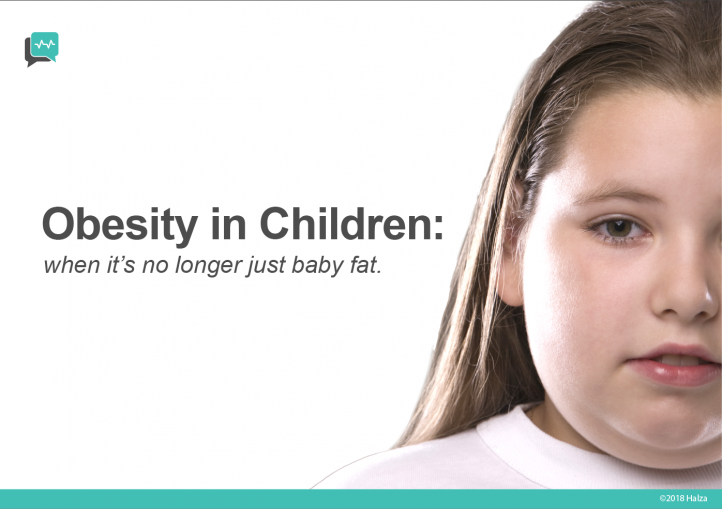Obesity In Children: When It’s No Longer Just Baby Fat

Overweight kids and the health risks they face. A pudgy child tends to incite coos and possibly the pinching of cheeks, and it’s not hard to see why – fat children can be rather endearing. But under those “cute” fat folds are some serious health problems either waiting to happen or need treatment immediately.
Covered here is the darker side of having an overweight child, health risks involved, and what can be done to combat the issue:
What are the causes of childhood obesity?

● Genetic makeup
Like other diseases, obesity runs in the family. If you, your partner, or other blood relatives are overweight, your child will have a tendency to follow suit. That said, this isn’t written in stone – you can still prevent the condition by inculcating the right habits.
● A sedentary lifestyle

Children these days have increasingly sedentary lifestyles, with a lot of time spent sitting down in front of the television or playing video games rather than being active.
● Overfeeding and unbalanced diets
An excess of milk intake as an infant can increase the chances of a child being overweight or obese as he grows up. Unhealthy diets with high amounts of sugar and fat can also play a part.
What are the health risks of childhood obesity?

● Increased risk of diseases like Diabetes
While uncommon, it is possible for children to fall prey to chronic illnesses such as Diabetes, Cancer, and cardiovascular problems. Even if they don’t develop such diseases immediately, their risks of becoming victims in adulthood will be more than doubled.
● Joint problems
Excess weight being supported by one’s body can strain their joints, even at a tender age.
● Breathing difficulties and asthma
An overweight kid can become out of breath more easily. Studies have shown that for every additional unit of BMI, children have a 55% higher chance of developing asthma.

● Higher possibility of becoming an obese adult
Children who are obese have higher chances of being obese and in poor health during adulthood. By then, it’ll be much harder to treat the complications that come along with being overweight, and symptoms would have increased in severity.
Tips for preventing obesity and helping an overweight child slim down

● Avoid using milk or snacks to pacify or reward your child
Parents tend to hand young children a bottle of milk as the go-to solution for crying or tantrums. While this may appease your child, it’s also a surefire way to overfeed. Try using toys or books to distract him when they get cranky instead.
Similarly, instead of rewarding your child with unhealthy snacks like chips and gummies, consider giving them non-edible treats like stickers or a trip to the movies for doing well in school tests.
● Encourage exercise through fun games

Perhaps the iPad may keep your child occupied and even stimulate his mind, but nothing can compare to old-school fun in the sun. Encourage physical activity through outdoor games or sports such as badminton, swimming, a game of tag, or even dancing. These are less intense and more enjoyable than full-blown training regimes.
To further motivate your child, set aside some time to partake in these activities together, as a form of parent-child bonding.
● Limit unhealthy snacks and soft drinks, and make their favourite dishes healthier
Try not to let your kids have free reign over the pantry until they are older and know their limits. Restrict their intake of soft drinks – these contain an average of 8 tablespoons of sugar – and build the good habit of drinking water by preparing a bottle for them to carry wherever they go.
It would help to make their favourite dishes healthier by adding more wholesome ingredients (eg: brown rice instead of white rice), or switching up the cooking method. For example, instead of deep-frying chicken, try baking it in a casserole with cheese and tomatoes – it can taste just as good!
● Lead through example – eat your greens!

Eating healthily starts at home. Meal preferences are shaped from a young age, and your children have a higher chance of liking a certain type of nosh if they see you enjoying it too. So set a good example and include healthy food like fruits and vegetables in your diet.
Dealing with an obese or overweight child
It’s all too easy to pamper a child with extra heapings of good food. But in order to truly give your child the very best, feed them in moderation, prepare healthier meals, and discipline them if they overeat too often.
If your child is already overweight or obese, we hope you’ll heed our tips above, and lead your child to better health – it’ll go a long way beyond their childhood years too.
Disclaimer: this website does not provide medical advice. The information, including but not limited to, text, graphics, images and other material contained on this website are for informational purposes only. The purpose of this website is to promote broad consumer understanding and knowledge of various health topics. It is not intended to be a substitute for professional medical advice, diagnosis or treatment. Always seek the advice of your physician or other qualified health care provider with any questions you may have regarding a medical condition or treatment and before undertaking a new health care regimen, and never disregard professional medical advice or delay in seeking it because of something you have read on this website.